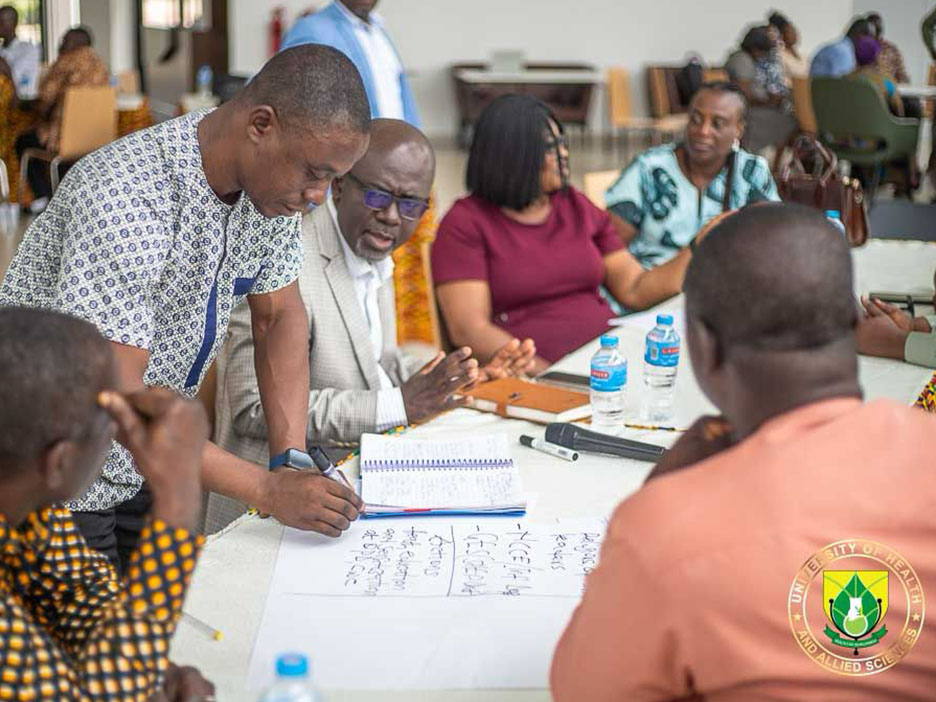
The Centre for Neglected Tropical Diseases Research (CNTDR) in the Institute of Health Research (IHR), University of Health and Allied Sciences (UHAS) reinforced its commitment to eliminating Neglected Tropical Diseases (NTDs) in deprived populations in Africa through a research dissemination meeting held at Ensign Global University College at Kpong on Monday, July 7, 2025 to discuss the findings of an implementation research project entitled "Implementation Research to Improve Schistosomiasis Control in Affected Communities in the Lower Volta Basin".
Based on a baseline study findings conducted across three districts, namely Shai Osudoku, South Tongu and Asuogyaman, the CNTDR partnered with Ghana Health Service (GHS) and the Volta River Authority (VRA) to implement enhanced strategies resulting in improved Mass Drug Administration (MDA) and reduced schistosomiasis (bilharzia) prevalence.
The discussions at the meeting which focused on the implementation of Water, Sanitation and Hygiene (WASH) intervention mapping, brought together key stakeholders comprising officials of the National Neglected Tropical Diseases Control Programme, Regional Health Directorates of the three catchment regions (Volta, Greater Accra and Eastern), Health Directorates of study districts / municipal Assemblies, VRA, Centre for Scientific and Industrial Research, Water Research Institute, Geohydro Tracks Ltd, Project Maji, Easy Water, Volta River Estates Ltd, Golden Exotic Ltd, PurAID, traditional leaders and the Member of Parliament for South Tongu Constituency.
In his address, the Principal Investigator and immediate past Vice Chancellor of UHAS, Professor John Owusu Gyapong, highlighted the interesting genesis of the UHAS-VRA collaboration. ‘During the COVID-19 pandemic, when the Volta River Authority faced challenges in examining samples, UHAS stepped in to provide sampling services at no cost. This act of solidarity laid the foundation for our current partnership,’ he said. He added that the collaboration has subsequently evolved into a two-year comprehensive research programme aimed at improving MDA and reducing the prevalence of schistosomiasis, a disease caused by parasitic worms which develop in freshwater snails and enter humans through the skin, having symptoms like abdominal pain, diarrhea, bloody stool, blood urine, etc.
The Director of CNTDR, IHR-UHAS, Dr. Alfred Manyeh, presented key findings of the study. These included poor knowledge about schistosomiasis, inadequate water supply, non-functioning boreholes, poor maintenance of WASH facilities, frequent breakdown of WASH facilities, fast growth of water weeds and heavy dependence on river and canal water. He also presented a proposed WASH interventions specifying model to guide the implementation of WASH interventions in the study communities.
A Principal Research Officer at the Public Health Section of VRA, Ms. Elizabeth Kisson, also presented an update on the enhanced implemented MDA. The report outlined improved social mobilization and sensitization, increase in MDA coverage and reduction in schistosomiasis prevalence in the study communities.
The Chairperson for the programme, Professor Margaret Gyapong highlighted the critical importance of WASH interventions in community health programmes and made a passionate appeal to government, traditional leaders and opinion leaders to help in curbing the menace. ‘We need more inputs from the assemblies and also a sustained government support to address this menace,’ she said.
The Member of Parliament for South Tongu, Honourable Maxwell Lukutor in his remarks commended UHAS, VRA, GHS and the other stakeholders for their commitment towards ensuring that the health challenges are surmounted.
The Municipal Chief Executive for South Tongu, Honourable Victoria Dzeklo, emphasized the need for community ownership in such programmes and called for increased involvement of assembly and presiding members in future programmes.
The UHAS-VRA-GHS partnership represents a model of inter-institutional collaboration, demonstrating how academic institutions can work with corporate partners and government agencies to address pressing public health challenges in communities.